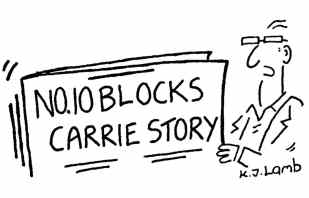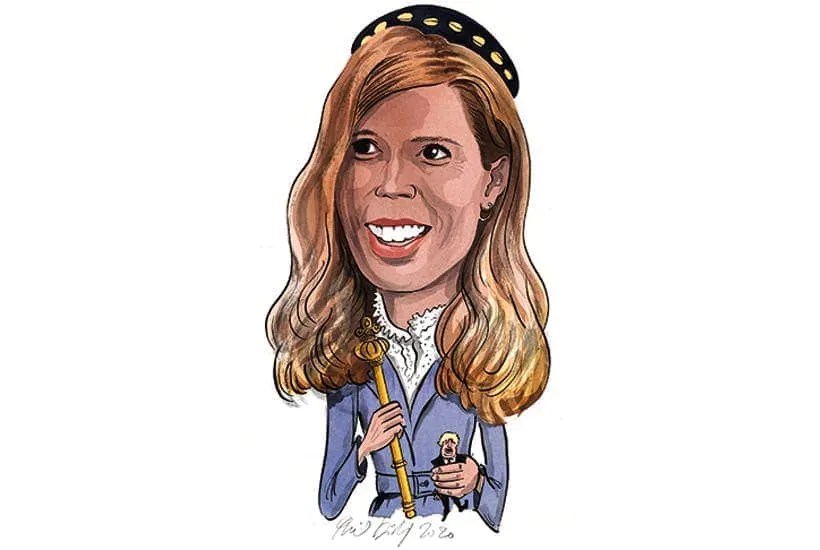One is not usually surprised by opinions volunteered to parliamentary hopefuls by voters on whose doors the candidate has knocked; but last week, dropping in on the Tiverton and Honiton by-election, I was taken aback by a subject that came up a number of times. It seemed so relatively unimportant.
The door-knocker in this case was Richard Foord, the Liberal Democrat candidate in a safe Conservative seat that looked in imminent danger of falling to his party. I was following him around as he canvassed in the Devon town of Honiton. You may know by the time you read this whether the Conservatives clung on, but you don’t need reminding that they were up against it.
I should say at once that my sample of opinion was minuscule: I had perhaps an hour with Mr Foord. And I mostly heard what one would expect. Almost everyone was out of love with Boris Johnson but – despite him – there were still some who were thinking of voting Conservative. So far, so predictable, though (predictably too) Mr Johnson’s stance on Ukraine was generally approved of. Cost of living came up, of course; Brexit no longer seemed a big issue; Keir Starmer was never mentioned; and the thought was expressed that ‘levelling up’ ought to be applied to the West Country, not just the Midlands and the north of England.

None of this was surprising. What was, was that the Prime Minister’s wife seemed to be an issue. Who did she think she was? Should an unelected person wield the influence she did? How much power did she have over government policy? Oughtn’t we to be told? That sort of thing.
It’s perhaps to Carrie Johnson’s credit that she has already carved herself a name as an influencer, and voters do have some sense of what she thinks important – green policies, the plight of endangered species, environmental threats. But still I found myself suppressing an urge to join the conversation and spring to her defence.
I do not know Mrs Johnson at all. I don’t think I’ve even met her. I know she’s a friend of the interior designer Lulu Lytle, and Ms Lytle’s a big supporter of the Wild Camels Protection Foundation and so am I, and that’s my closest link to Carrie: a positive one. But all this is beside the point, which is that we seem to have it in for prime ministers’ wives, we give them an often rotten time, and that’s mean, unjust and a tiny bit misogynistic.
Why shouldn’t Mrs J have ideas about the environment, why shouldn’t she express alarm about global warming, and why shouldn’t she urge her opinions on Mr J? He doesn’t have to take any notice, and if he chooses to be compliant for the sake of a quiet life that would be a weakness in him, not a fault in her.
It appears that influence by a male spouse over his female partner is considered unexceptional – we joked about Denis Thatcher – but when it is the other way round, it’s seen as somehow sinister. Shakespeare’s Lady Macbeth is evidence that suspicion of undeclared female influence in a marriage runs deep and ancient in our culture. Feminists might put it down to male contempt for women; but I wonder whether it might be male fear of women.
Why shouldn’t Mrs J have ideas about the environment?
Eleanor Roosevelt had to put up with this all her life, and indeed FDR was almost certainly influenced by his wife, and a good thing too. But it does seem, even today, that a PM’s wife has to choose between being seen as (1) a boring house-mouse; (2) too independent, and neglectful of her husband’s need for support in the poor lamb’s lonely life; or (3) a scheming minx, twisting our apparent leader around her little finger. Or all three.
One incident stands out in my memory as being, though in itself trivial, an injustice for which those who gave media wings to the image and those who lapped it up should still feel a bit ashamed. Around 8 a.m. on the morning after Labour’s 1997 general election victory, flowers were delivered to the Blairs’ Islington front door, probably only hours after the couple had laid their heads down to sleep. That’s all really – except that Cherie opened the door to the courier, and in the second while she stood there, hovering media photographers managed to snap and video her in a nightie, looking as dishevelled as you or I would in those circumstances. Ha ha ha.
This marked the beginning of ten years in which the print media seemed uneasy about Cherie Blair, not quite knowing what to make of a conspicuously successful lawyer who was also rather left-wing, and united only in the vague suspicion that she was some kind of leftie battleaxe (why are men never battleaxes?) pouring socialist poison into her mildly unideological husband’s ear. Remarks caught off-camera were ‘outbursts’; any indication that she had sharp-edged convictions was seized upon; and such minor blunders as would befall anyone trying to juggle a distinguished legal career, four children, interests and pursuits of her own, and a husband who was prime minister, were turned into stories.
Cherie Blair’s mistake, perhaps, was being human, and I’m not (I think) oversensitive in concluding that she caught the force of a political media finding it hard to get a handle on her husband, and so slipping easily into the ready-made narrative of husband on stage, wife in the wings.
Carrie Johnson, too, makes an easier target than her Teflon husband. ‘Cherchez la femme.’ I don’t share Mrs Johnson’s taste in wallpaper, but Mr J could have said no. I do share her interest in the future of the planet and I’m sorry he does seem to have said no. Whether I’d like her if I knew her, I have no idea – maybe not. But I dislike our culture’s predilection for seeing something threatening in a prime minister’s wife with a mind of her own. So carry on Carrie.
This article is from the upcoming issue of The Spectator, out on Thursday







Comments